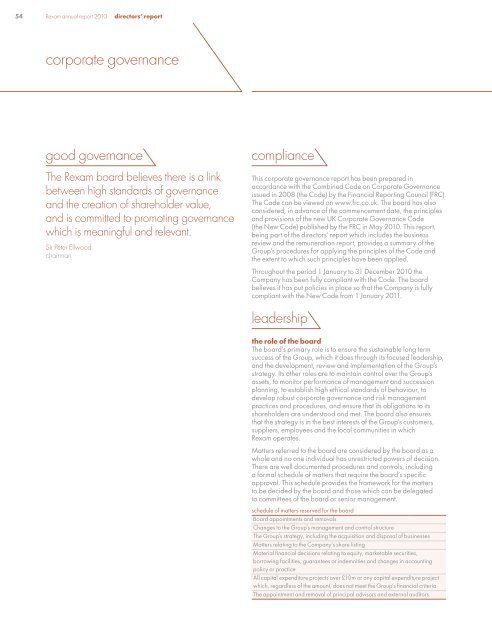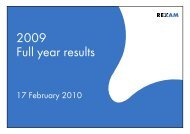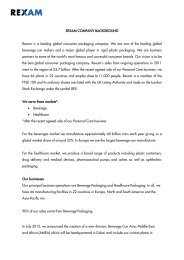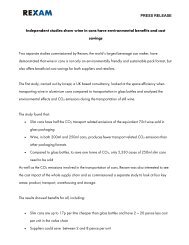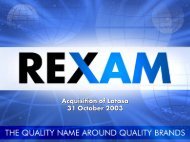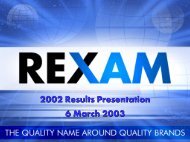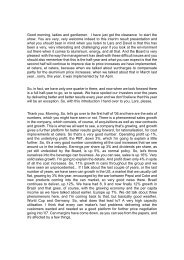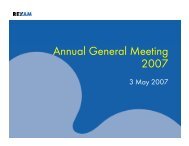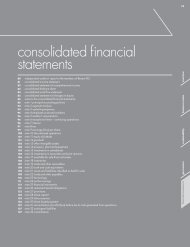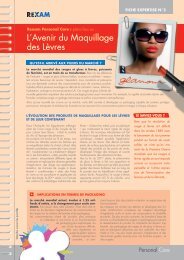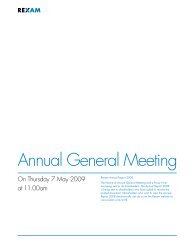Rexam annual report 2010 - Governance
Rexam annual report 2010 - Governance
Rexam annual report 2010 - Governance
You also want an ePaper? Increase the reach of your titles
YUMPU automatically turns print PDFs into web optimized ePapers that Google loves.
54 <strong>Rexam</strong> <strong>annual</strong> <strong>report</strong> <strong>2010</strong> directors’ <strong>report</strong><br />
corporate governance<br />
good governance<br />
The <strong>Rexam</strong> board believes there is a link<br />
between high standards of governance<br />
and the creation of shareholder value,<br />
and is committed to promoting governance<br />
which is meaningful and relevant.<br />
Sir Peter Ellwood<br />
chairman<br />
compliance<br />
This corporate governance <strong>report</strong> has been prepared in<br />
accordance with the Combined Code on Corporate <strong>Governance</strong><br />
issued in 2008 (the Code) by the Financial Reporting Council (FRC).<br />
The Code can be viewed on www.frc.co.uk. The board has also<br />
considered, in advance of the commencement date, the principles<br />
and provisions of the new UK Corporate <strong>Governance</strong> Code<br />
(the New Code) published by the FRC in May <strong>2010</strong>. This <strong>report</strong>,<br />
being part of the directors’ <strong>report</strong> which includes the business<br />
review and the remuneration <strong>report</strong>, provides a summary of the<br />
Group’s procedures for applying the principles of the Code and<br />
the extent to which such principles have been applied.<br />
Throughout the period 1 January to 31 December <strong>2010</strong> the<br />
Company has been fully compliant with the Code. The board<br />
believes it has put policies in place so that the Company is fully<br />
compliant with the New Code from 1 January 2011.<br />
leadership<br />
the role of the board<br />
The board’s primary role is to ensure the sustainable long term<br />
success of the Group, which it does through its focused leadership,<br />
and the development, review and implementation of the Group’s<br />
strategy. Its other roles are to maintain control over the Group’s<br />
assets, to monitor performance of management and succession<br />
planning, to establish high ethical standards of behaviour, to<br />
develop robust corporate governance and risk management<br />
practices and procedures, and ensure that its obligations to its<br />
shareholders are understood and met. The board also ensures<br />
that the strategy is in the best interests of the Group’s customers,<br />
suppliers, employees and the local communities in which<br />
<strong>Rexam</strong> operates.<br />
Matters referred to the board are considered by the board as a<br />
whole and no one individual has unrestricted powers of decision.<br />
There are well documented procedures and controls, including<br />
a formal schedule of matters that require the board’s specific<br />
approval. This schedule provides the framework for the matters<br />
to be decided by the board and those which can be delegated<br />
to committees of the board or senior management.<br />
schedule of matters reserved for the board<br />
Board appointments and removals<br />
Changes to the Group’s management and control structure<br />
The Group’s strategy, including the acquisition and disposal of businesses<br />
Matters relating to the Company’s share listing<br />
Material financial decisions relating to equity, marketable securities,<br />
borrowing facilities, guarantees or indemnities and changes in accounting<br />
policy or practice<br />
All capital expenditure projects over £10m or any capital expenditure project<br />
which, regardless of the amount, does not meet the Group’s financial criteria<br />
The appointment and removal of principal advisors and external auditors


